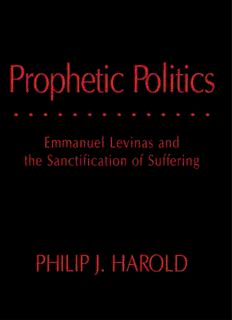Table Of ContentProphetic Politics
You are reading copyrighted material published by Ohio University Press/Swallow Press.
Unauthorized posting, copying, or distributing of this work except as permitted under U.S. copyright law is illegal
and injures the author and publisher.
S e r i e S i n C o n t i n e n ta l t h o u g h t
editorial Board
Ted Toadvine, Chairman, University of Oregon
Elizabeth A. Behnke, Study Project in Phenomenology of the Body
David Carr, Emory University
James Dodd, New School University
Lester Embree, Florida Atlantic University
José Huertas-Jourda, Wilfrid Laurier University†
Joseph J. Kockelmans, Pennsylvania State University
William R. McKenna, Miami University
Algis Mickunas, Ohio University
J. N. Mohanty, Temple University
Dermot Moran, University College Dublin
Thomas Nenon, University of Memphis
Rosemary Rizo-Patron de Lerner, Pontificia Universidad Católica del Perú, Lima
Thomas M. Seebohm, Johannes Gutenberg Universität, Mainz
Gail Soffer, Rome, Italy
Elizabeth Ströker, Universität Köln†
Nicolas de Warren, Wellesley College
Richard M. Zaner, Vanderbilt University
international advisory Board
Suzanne Bachelard, Université de Paris†
Rudolf Boehm, Rijksuniversiteit Gent
Albert Borgmann, University of Montana
Amedeo Giorgi, Saybrook Institute
Richard Grathoff, Universität Bielefeld
Samuel Ijsseling, Husserl-Archief te Leuven
Alphonso Lingis, Pennsylvania State University
Werner Marx, Albert-Ludwigs Universität, Freiburg†
David Rasmussen, Boston College
John Sallis, Boston College
John Scanlon, Duquesne University
Hugh J. Silverman, State University of New York, Stony Brook
Carlo Sini, Università di Milano
Jacques Taminiaux, Louvain-la-Neuve
D. Lawrence Wieder†
Dallas Willard, University of Southern California
You are reading copyrighted material published by Ohio University Press/Swallow Press.
Unauthorized posting, copying, or distributing of this work except as permitted under U.S. copyright law is illegal
and injures the author and publisher.
Prophetic Politics
..................................
emmanuel levinas and
the Sanctification of Suffering
PhiliP J. harold
ohio University Press athens
You are reading copyrighted material published by Ohio University Press/Swallow Press.
Unauthorized posting, copying, or distributing of this work except as permitted under U.S. copyright law is illegal
and injures the author and publisher.
Ohio University Press, Athens, Ohio 45701
www.ohioswallow.com
© 2009 by Ohio University Press
All rights reserved
To obtain permission to quote, reprint, or otherwise reproduce or distribute
material from Ohio University Press publications, please contact our rights and
permissions department at (740) 593-1154 or (740) 593-4536 (fax).
Printed in the United States of America
Ohio University Press books are printed on acid-free paper ∞ ™
16 15 14 13 12 11 10 09 5 4 3 2 1
Library of Congress Cataloging-in-Publication Data
Harold, Philip J.
Prophetic politics : Emmanuel Levinas and the sanctification
of suffering / Philip J. Harold.
p. cm. — (Series in continental thought ; no. 37)
Includes bibliographical references and index.
ISBN 978-0-8214-1895-6 (hc : alk. paper)
1. Lévinas, Emmanuel. I. Title.
B2430.L484H376 2009
194—dc22
2009028435
You are reading copyrighted material published by Ohio University Press/Swallow Press.
Unauthorized posting, copying, or distributing of this work except as permitted under U.S. copyright law is illegal
and injures the author and publisher.
For David Walsh
and Keith Woods
You are reading copyrighted material published by Ohio University Press/Swallow Press.
Unauthorized posting, copying, or distributing of this work except as permitted under U.S. copyright law is illegal
and injures the author and publisher.
You are reading copyrighted material published by Ohio University Press/Swallow Press.
Unauthorized posting, copying, or distributing of this work except as permitted under U.S. copyright law is illegal
and injures the author and publisher.
There will be horror on all sides, and, of course,
more false than sincere. People fear only what directly
threatens their personal interests. I’m not speaking of
the pure souls: they will be horrified and will blame
themselves, but they will not be noticeable.
—Bishop Tikhon, Dostoevsky’s Demons
Don’t answer questions for God.
—a devout Rabbi
You are reading copyrighted material published by Ohio University Press/Swallow Press.
Unauthorized posting, copying, or distributing of this work except as permitted under U.S. copyright law is illegal
and injures the author and publisher.
You are reading copyrighted material published by Ohio University Press/Swallow Press.
Unauthorized posting, copying, or distributing of this work except as permitted under U.S. copyright law is illegal
and injures the author and publisher.
C o n t e n t S
...................................
Acknowledgments xi
Abbreviations xiii
Introduction xv
From Ethics to Politics xvi
The Need for a Prophetic Politics xxvi
1 Death, Escape, and Thinking beyond Being 1
Ethics and the Prophetic 6
Heidegger, Death, and Sacrifice 12
2 Play and Responsibility 23
The Third 24
Maturity and Self-Delimitation 31
Two Forms of Play 35
Existence and Existents 38
The “There Is” 44
Position 50
Bergson 53
3 The Philosophical Ethics of Totality and Infinity 61
A Caricature of a Position 61
The “Source” of Ethics 62
Rosenzweig 65
The Ethical Turn 67
Totality and Infinity 75
The Feminine 86
Adieu to Totality and Infinity 92
4 The Turning Point: “Violence and Metaphysics” 95
The Worst Violence 95
The Self-Contradiction of Totality and Infinity 97
Derrida 100
You are reading copyrighted material published by Ohio University Press/Swallow Press.
Unauthorized posting, copying, or distributing of this work except as permitted under U.S. copyright law is illegal
and injures the author and publisher.
Description:In Prophetic Politics, Philip J. Harold offers an original interpretation of the political dimension of Emmanuel Levinas’s thought. Harold argues that Levinas’s mature position in Otherwise Than Being breaks radically with the dialogical inclinations of his earlier Totality and Infinity and that

